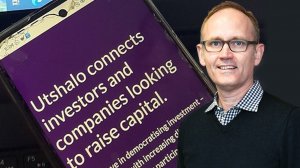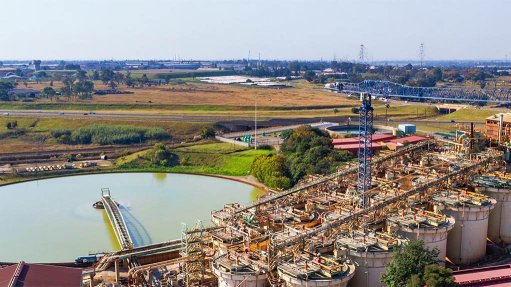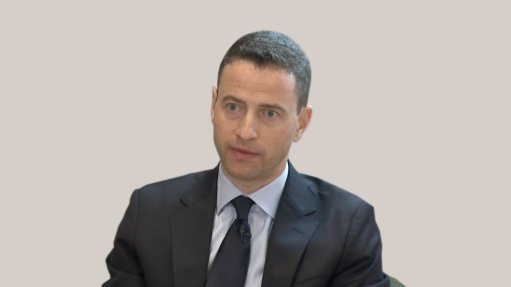Orion’s capital-raising success kindling hopes of greater small-end investment in mining

Utshalo founder Paul Miller interviewed by Mining Weekly's Martin Creamer. Video: Darlene Creamer.
JOHANNESBURG (miningweekly.com) – The capital-raising success that emerging copper and zinc mining company Orion Minerals achieved is kindling high hopes that smaller South African shareholders will be facilitated to play a greater role in providing funding for new mining development and concomitant job creation.
Johannesburg- and Sydney-listed Orion has succeeded in bringing Australian Stock Exchange-style shareholder participation to smaller South African shareholders – and steps are being taken now to encourage a lot more of the same on the Johannesburg Stock Exchange (JSE).
“We can't really say that we’ve failed to raise money from retail in South Africa because we haven't tried, and now here’s someone who came along tried and got it right,” Utshalo founder Paul Miller commented to Mining Weekly in a Zoom interview. (Also watch attached Creamer Media video.)
Interestingly, of the R44-million-plus raised by Orion, the bulk – R33-million – was from small-end South African shareholders keen to increase their investment in the timely copper and zinc mines being developed in the Northern Cape.
“The Orion Minerals process has taught me that ordinary South Africans do want to own shares directly,” Miller said, in reference to direct ownership of shares by ordinary South Africans being a pale shadow of the massive ownership by about ten large-end South African financial institutions, which manage more than 90% of South Africa’s savings.
“There's been a significant change to the advantages that the regulators have given to large funds and how they've discriminated against individual investors.
“It was amazing what response we got from the market when we went out there to link up, really, with existing Orion shareholders,” Miller added.
Utshalo’s efforts to reach those investors in a new digital way assisted and although the Orion offer closed on the 23rd of July, Utshalo still has investors coming in, signing up on its website, and effectively putting their hands up for future similar offers.
“But I think it's important that while we show progress, we still need to lobby and campaign for our market regulators to take the same kind of steps that have been taken in other dynamic markets like Canada, Australia and the UK, where individual investors are given the credit they deserve as an important participant in the smaller end of the stock exchange.”
An increasing number of concerned South Africans believe that this is conceivably the main reason why there are fewer than 100 companies on the JSE, which has been on a downward trajectory for the last 15 years.
Last year was the worst year on record for new JSE listings and primary capital raisings, despite many viewing the critical minerals boom as an opportunity to raise money for copper, lithium and graphite companies.
Mining Weekly: Most people agree that it’s economically important that South Africa’s mineral endowment and the Johannesburg Stock Exchange must be rejoined at the hip to help to fund lagging mining growth and to create jobs that are urgently needed. What is in the way of this being achieved?
Miller: The penny has not dropped with the financial regulators, with the exception, possibly, of the South African Reserve Bank, that there's a problem if you over-concentrate the buy side in your stock exchange, and that for smaller companies, particularly those out of the top 100, they need a diversity of smaller investors, small institutions, hedge funds, individuals, participating in the market. That penny hasn't dropped.
What is the potential for companies needing capital investment to achieve the same success as Orion from mainly smaller South African shareholders?
We have to recognise that South Africa’s had a long history of inclusion in the financial markets. There's a whole generation of investors who grew up investing in new mines, participating in capital raisings. Many of them are aging now. We've had about two decades where there hasn't been much activity on that front because there's been significant change to the way our savings industry is structured.
Is what Orion has achieved with its share purchase plan only possible for the likes of the dual-listed Orion?
Well, no. Orion brought the innovation to South Africa from Australia, but I don't see any regulatory impediment for why very similar transactions couldn't be done in South Africa. We’re quite used to, in South Africa, having what we call accelerated book builds. That's when the company appoints an adviser, the adviser contacts the financial institutions, generally a couple of phone calls out to Cape Town, the money's raised overnight and it's announced the following morning, and that's done in terms of the general authority to issue shares for cash. Now, South Africa makes no distinction in regulation or law between institutional investors and retail investors, so retail investors are excluded from participating in accelerated book builds very much for reasons of practicality and convenience on the side of the advisers and the companies. So, we can challenge that, and we can say, look, there's no regulatory impediment. You can do your accelerated book build, but offer your existing shareholders a share purchase plan, the Australian-style share purchase plan, so that they can have the same opportunity, on the same terms, in a practical time scale. That's effectively what Orion has taught us. You can do it in South Africa. Remember, if you make an offer to your own shareholders, it's not an offer to the public.
Although Orion’s primary listing is in Sydney, what do you make of more than R33-million of the R44-million raised coming from South African shareholders?
Again, it was further emphasis for me that ordinary South Africans want to own shares directly. But at the same time, it's the media environment that's changed. You'll remember when you got all your business news out of the newspaper first thing in the morning, and there might be a full-page advertisement in there for a new share offer by a company. Now, there's no equivalent anymore. There's no single source of information anymore, so it was our efforts to reach those investors in a new digital way that I think assisted Orion with its placing and the market responded. When you give people the opportunity to participate, they might well.
Utshalo has nearly 750 investors on its platform. Could this signal the potential reawakening of South Africans to public markets?
The potential's always been there. It's just that the imagination hasn't existed in our advisory community on how to reach those people. Now, we've tried to fill that vacuum, and we've been amazed at how many people are still signing up.
What more can be done to bring smaller South African shareholders to market?
I'm hoping that we will be able to bring more opportunities to investors, so I encourage people to head over to our website and sign up so they can participate in those. That's one thing that can be done, but also we need our regulators and the market itself and the exchange operators to appreciate that we need a diverse investor body, across institutions, companies, charities, trusts and individuals, all making independent decisions about buying and selling shares on the stock exchange. We cannot give up and go to a situation where ten major financial institutions manage more than 90% of all savings, and we have fewer than 100 companies on the stock exchange, which is the trajectory we've been on for the last 15 years.
Finally, what’s the main point that viewers, listeners and readers should take way from this interview?
They must realise that they have agency, and they’re perfectly entitled to participate as the public in our public markets, and that they need to sign up. I'm not suggesting that everyone puts their entire pension fund into smaller companies on the stock exchange. But to have a stake in the economy, to have an interest in the companies that are operating, to be a participant, is actually important, especially as South Africa transforms and changes.
Article Enquiry
Email Article
Save Article
Feedback
To advertise email advertising@creamermedia.co.za or click here
Press Office
Announcements
What's On
Subscribe to improve your user experience...
Option 1 (equivalent of R125 a month):
Receive a weekly copy of Creamer Media's Engineering News & Mining Weekly magazine
(print copy for those in South Africa and e-magazine for those outside of South Africa)
Receive daily email newsletters
Access to full search results
Access archive of magazine back copies
Access to Projects in Progress
Access to ONE Research Report of your choice in PDF format
Option 2 (equivalent of R375 a month):
All benefits from Option 1
PLUS
Access to Creamer Media's Research Channel Africa for ALL Research Reports, in PDF format, on various industrial and mining sectors
including Electricity; Water; Energy Transition; Hydrogen; Roads, Rail and Ports; Coal; Gold; Platinum; Battery Metals; etc.
Already a subscriber?
Forgotten your password?
Receive weekly copy of Creamer Media's Engineering News & Mining Weekly magazine (print copy for those in South Africa and e-magazine for those outside of South Africa)
➕
Recieve daily email newsletters
➕
Access to full search results
➕
Access archive of magazine back copies
➕
Access to Projects in Progress
➕
Access to ONE Research Report of your choice in PDF format
RESEARCH CHANNEL AFRICA
R4500 (equivalent of R375 a month)
SUBSCRIBEAll benefits from Option 1
➕
Access to Creamer Media's Research Channel Africa for ALL Research Reports on various industrial and mining sectors, in PDF format, including on:
Electricity
➕
Water
➕
Energy Transition
➕
Hydrogen
➕
Roads, Rail and Ports
➕
Coal
➕
Gold
➕
Platinum
➕
Battery Metals
➕
etc.
Receive all benefits from Option 1 or Option 2 delivered to numerous people at your company
➕
Multiple User names and Passwords for simultaneous log-ins
➕
Intranet integration access to all in your organisation


















